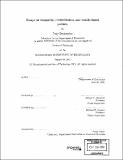| dc.contributor.advisor | Abhijit V. Banerjee and Michael R. Kremer. | en_US |
| dc.contributor.author | Benhassine, Najy, 1970- | en_US |
| dc.contributor.other | Massachusetts Institute of Technology. Dept. of Economics. | en_US |
| dc.date.accessioned | 2005-08-23T18:24:58Z | |
| dc.date.available | 2005-08-23T18:24:58Z | |
| dc.date.copyright | 2001 | en_US |
| dc.date.issued | 2001 | en_US |
| dc.identifier.uri | http://hdl.handle.net/1721.1/8222 | |
| dc.description | Thesis (Ph. D.)--Massachusetts Institute of Technology, Dept. of Economics, 2001. | en_US |
| dc.description | Leaf 125 blank. | en_US |
| dc.description | Includes bibliographical references (leaves 118-124). | en_US |
| dc.description.abstract | This thesis is a contribution to the theory and empirics of inequality, redistribution and growth. It is divided in three chapters. Two of them study theoretical models of inequality, wealth-based politics and redistribution. The third chapter is an empirical contribution to the literature on growth and the income distribution In the first chapter, we explore the theoretical relation between economic and political inequality and redistribution policy. Using a static model of politics in which wealth determines political power, we study the relationship between a society's level of inequality, its political system, and the redistributive policies it will choose. We explore the widely used argument that the wealthier have more political power which they can use to oppose efficient redistributions. We show that the effect of a rise in inequality on the wealth of the decisive voter does not depend on the wealth bias in the political system per se, but on the extent to which political power is unequally distributed relative to the initial level of wealth inequality. Moreover, we find that the curvature of the political function that links wealth to political weight determines how political power is shifted from the poor to the rich following a rise in inequality. We illustrate these results by using three simple political mechanisms, including a widely used model of political exclusion based on wealth. We show that, contrary to the usual argument, societies where political participation is limited to a small wealthy elite are more subject to redistributive pressures when their level of inequality increases, compared to less exclusive societies. | en_US |
| dc.description.abstract | (cont.) We use specific historical examples to support the implications of the model. The second chapter extends the model presented in chapter one to a two-period framework. The idea is to model how the prospect of future distributional conflicts affect present choices of redistribution and political reform when wealth gives political power. The aim of the model is to shed some light on the incentives of the politically powerful to pursue distributional policies that can be growth enhancing, when these policies adversely affect their future political weight. We illustrate this dynamic distributional conflict using two simple models of political power, where political weight depend on wealth or on rank in the income distribution. We show that the more wealth-biased the political system, the lower will be the redistribution rate in period 1, as the future political cost of redistributing is higher. We also provide some insights on how these dynamics behave when considering a more general form of political system. Finally, we introduce political change into the framework and present a model of franchise extension and redistribution that entails a risk of revolution. We find that when political weight is based on wealth, then an elite which chooses not to extend the franchise early, will choose a higher rate of redistribution, the higher the probability of a revolution occurring in period 2. The idea being that in a wealth-based political system, the expected future political cost of redistributing income in the first period is lower, the higher the probability that a revolution abolishes this wealth-based system ... | en_US |
| dc.description.statementofresponsibility | by Najay Benhassine. | en_US |
| dc.format.extent | 125 leaves | en_US |
| dc.format.extent | 7999758 bytes | |
| dc.format.extent | 7999516 bytes | |
| dc.format.mimetype | application/pdf | |
| dc.format.mimetype | application/pdf | |
| dc.language.iso | eng | en_US |
| dc.publisher | Massachusetts Institute of Technology | en_US |
| dc.rights | M.I.T. theses are protected by copyright. They may be viewed from this source for any purpose, but reproduction or distribution in any format is prohibited without written permission. See provided URL for inquiries about permission. | en_US |
| dc.rights.uri | http://dspace.mit.edu/handle/1721.1/7582 | |
| dc.subject | Economics. | en_US |
| dc.title | Essays on inequality, redistribution and wealth-based politics | en_US |
| dc.type | Thesis | en_US |
| dc.description.degree | Ph.D. | en_US |
| dc.contributor.department | Massachusetts Institute of Technology. Department of Economics | |
| dc.identifier.oclc | 50147411 | en_US |
